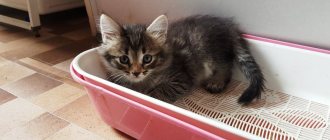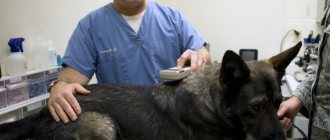One of the most common diseases found in all domestic animals is helminthiasis, that is, infection with worms. The waste products of these parasites poison the body, disrupting the functioning of internal organs. To avoid complications, every owner should be aware of how and what is the best way to deworm a cat for treatment or prevention.
Symptoms of helminth infection
When parasites enter an animal’s body and begin to actively multiply, this manifests itself at the physiological and behavioral levels. There are signs that suggest the presence of a helminthic infestation. Conventionally, they are divided into two groups: general symptoms and specific, that is, characteristic of a disease caused by a specific pathogen.
The manifestation of symptoms is influenced not only by the type of parasite, but also by the general health of the cat, its age and body weight, and the duration of helminthiasis.
Common features include:
- Lethargy and apathy. Kittens may experience delays in growth and development. This is especially noticeable when compared with healthy kittens of the same age. In parallel with these general abnormalities, the cat exhibits special signs that may indicate the presence of a specific pathogen in the body. Many symptoms overlap:
- Rash around the anus. If even one symptom appears, you must contact a veterinary clinic for testing and diagnosing the disease.
The veterinarian prescribes a laboratory test of blood, stool, saliva, and smear. Helminthoovoscopic and helmintholarvoscopic methods help to establish an accurate clinical picture. Many signs can signal the progression of functional diseases in a cat, so an examination by a veterinarian to clarify the causes is mandatory.
Symptoms
One of the signs of the presence of parasites in a pet is considered to be riding on its butt.
- decreased appetite;
- disruption of the digestive system: vomiting, diarrhea, nausea;
- dullness of the coat;
- appearance of cough;
- weight loss;
- pallor of the mucous membranes;
- bad breath odor;
- itching of the anus, as a result of which the cat fidgets on its butt on the floor.
| Type of helminths | Description |
| Nematodes | Round worms that live in the small intestine of an animal |
| Disturbs digestion and causes vomiting | |
| Can lead to rupture of the intestinal walls due to its blockage | |
| Cestodes | Flat-bodied tape parasites |
| They have suction cups on their body, which they use to attach themselves to the walls of the animal’s organs. | |
| Trematodes | Hearts are flat and small in size |
| This species includes liver fluke and pulmonary endoparasites. |
It is not always possible to recognize helminthiasis in cats; some parasites live in the body for a long period without any signs of their existence.
In general, the symptoms of parasite infestation include the following:
- gastrointestinal disorder;
- weight loss;
- refusal of food;
- dull and tousled coat;
- cough;
- dyspnea;
- itching in the anus (fidgeting on the tail);
- yellowing or pallor of the mucous membranes.
If there is a massive infestation in the animal’s feces, adult parasites can be seen with the naked eye. A cat suffering from helminthiasis will lose its former activity; due to painful sensations, it may meow often and suddenly.
Parasites can stay in the body for a long time without showing symptoms.
If a kitten is sick, it will experience bloating and developmental delays. Advanced helminthiasis can lead to serious consequences. The animal may die if it is not treated in time.
- The presence of fleas is a direct sign of the appearance of worms in a cat.
- Invasive parasites can live not only in the intestines, but also in the bronchi, muscles, and liver, so a number of symptoms may be observed indicating the presence of helminths:
- general exhaustion of the body;
- dull coat;
- lethargic state of the pet;
- refusal of food or, conversely, increased appetite;
- thirst;
- weight loss;
- vomiting and diarrhea (the presence of parasites can be seen in vomit or feces).
- Small rashes around the anus.
- Kittens have swollen bellies, very pale mucous membranes (due to anemia), an upset stomach is replaced by constipation, bloody diarrhea.
Why are parasites dangerous?
By settling in a cat's body, parasitic worms cause enormous harm to its health. Intestinal helminths injure the mucous membrane of the stomach and intestines, causing internal bleeding and pain. If they multiply excessively, worms can cause obstruction of the intestinal tube.
Parasites take away a significant portion of the nutrients, thereby causing the animal to lose weight and lose immunity. Worms produce a large amount of waste products, which are toxins for the host animal. Intoxication and destruction of the tissues of the affected organs, primarily the liver, begins.
Pulmonary helminths, affecting the respiratory organs at a certain stage, cause shortness of breath, coughing, and wheezing. This directly makes breathing difficult. Heartworms in cats impair the blood supply to the body. Once in the heart, heartworms do not leave it and ultimately cause sudden death of the animal due to cardiac arrest.
Communication and contact with a sick pet can result in a family member being diagnosed with helminthiasis.
Tips and tricks
Deworming is a process that requires not only the correct choice of product, but also compliance with the dosage and timing of use. An overdose of anthelmintic drugs, as a rule, is not observed, but pregnant pets, as well as very small pets, are at risk. The main signs of an overdose include the appearance of convulsions and foam at the mouth, as well as tremors of the limbs and disruption of the respiratory system.
How many days to worm and how often
It is best to give anthelmintic drugs to cats in the morning, on an empty stomach, about an hour before the animal eats food. For the purpose of prevention, deworming is performed in pets starting from the age of one month. Such manipulations are usually carried out four times a year. It is necessary to deworm cats that have contact with street animals and are often walked approximately once a month.
Important! It should be remembered that adult animals are more resistant to helminths, so anthelmintics can be used once every six months.
When performing planned preventive or therapeutic deworming, the specifics of such an event must be taken into account. The drug is capable of destroying adult helminths, but has no effect on their eggs, so it is mandatory to re-administer the drug after ten days.
Before starting deworming, you must read the instructions and strictly adhere to the dosage recommended by the manufacturer.
How to worm kittens correctly
Kittens are dewormed only after the pet reaches three weeks of age. In the future, preventive deworming is carried out four times a year, as well as ten days before scheduled vaccination. For therapeutic purposes, treatment of kittens and removal of helminths is carried out according to indications. A severe degree of worm infestation in kittens requires repeated treatment ten days after the initial deworming.
This is interesting! As practice shows, overdose and severe side effects in kittens are observed when using drugs intended to rid adult pets of worms.
Currently, manufacturers produce drugs containing one main active component, which counteracts only a certain type of worms, as well as products based on a whole complex of active substances that help destroy various types of internal parasites. It is best to use drugs for deworming kittens that have a broad spectrum of action on all or many types, as well as the stages of development of helminths.
Is it possible to worm a pregnant cat?
A pregnant cat must be rid of helminths if the presence of such parasites disrupts the natural processes of growth and development of future offspring. The following are the most dangerous and severe signs of a cat being infected with worms during pregnancy:
- no appetite;
- the general condition of the pet noticeably deteriorates;
- There is an abundance of helminths in the feces.
If the cat, despite the presence of worms, looks cheerful and quite healthy, and also has a good appetite, then it is advisable to hold off on using anthelmintic drugs, since many such drugs cause miscarriage or the appearance of various severe congenital deformities in kittens. Deworming drugs are especially dangerous in the last third of pregnancy.
However, despite the proven harm of most antiparasitic drugs, if necessary, their use is completely justified and advisable. In this case, preference should be given to drugs whose active substance is characterized by low toxicity levels:
- "Drontal";
- "Dirofen";
- "Profender".
Highly toxic antiparasitic drugs such as Kanikvantel Plus, Prazitel and Polyvercan, which have a teratogenic and embryotoxic effect on the animal’s body, are strictly prohibited for use during pregnancy.
Important! Before choosing a remedy for deworming a pregnant cat, it is advisable to obtain qualified medical advice, and also carry out all therapeutic measures under the supervision of a veterinarian.
Is it possible to worm a nursing cat?
The presence of worms of any kind in the body of a pet is very dangerous, especially for a nursing cat . In the process of growth and vital activity, helminths release harmful substances that cause quite severe intoxication of the body.
As a result of such chronic poisoning, various allergic reactions often develop, and the liver tissue, which is forced to utilize toxins, also experiences a great negative impact.
Among other things, parasites in an animal’s body negatively affect the functioning of the heart and kidneys, and tapeworms cause intestinal obstruction or death of the animal. However, immediately after the birth of kittens, giving the cat special medications intended to kill helminths is strictly prohibited. The deworming procedure can be performed no earlier than four weeks after birth.
This is interesting! The best-proven complex preparations are Aziprin, Kanikvantel Plus, Dirofen and Pratel, as well as the sweet suspension for adult cats Prazitsid and Drontal.
Anthelmintic before vaccination
Kittens undergo their first vaccination at the age of two or three months, and a second vaccination is performed after another three weeks. Before vaccination is carried out, deworming must be performed. For this purpose, you can use the following well-proven anthelmintics:
- "Prasitel";
- "Polyverkan";
- "Dirofen";
- "Kaniquantel plus";
- "Dironet";
- "Profender";
- "Alben-S";
- "Azinox Plus";
- "Milbemax";
- "Milprazone."
After deworming, it is very important to give your pet special medications that contain a sufficient amount of prebiotics, or dietary fiber. This drug, fermented in the pet’s intestinal tract, will serve as the main food for developing beneficial microflora, and also stimulates and strengthens the immune system.
Return to content
When is it necessary to worm a cat?
There are many sources of worm infection in a cat's life. These can be raw animal products (meat, fish, eggs), dirty water. The threat is posed by blood-sucking insects, whose saliva introduces parasites into the animal’s blood.
The risk increases when a domestic cat comes into contact with outdoor cats. Any object on the street can contain helminth eggs on its surface. In this regard, every responsible owner of a furry pet knows about the need for timely deworming. The question arises when to give your cat an anthelmintic.
Antihelmintics must be prescribed if the diagnosis is confirmed. The dose of the anthelmintic drug is selected based on the animal’s body weight and age.
Preventive deworming for an adult animal should be repeated monthly or every three months, that is, 4 times a year.
This pattern should not be particularly violated if the cat is walking outside. In adult cats, signs of helminthiasis do not always manifest themselves to a significant degree, and because of this, the attention of even vigilant owners is dulled. Therefore, regular preventive use of anthelmintic drugs is mandatory even for completely domestic pets.
Some anthelmintics are given to the animal again after 10 days, since their active ingredients kill only adult worms and do not affect eggs. After 10-14 days, larvae emerge from the eggs, which die under the influence of a repeated dose of poison.
Unscheduled deworming is required before elective surgery or vaccination. Parasites weaken the cat's immunity, so in order to avoid negative consequences, before administering the vaccine (about 10 days in advance), it is necessary to use a deworming remedy.
Kittens begin to be given anthelmintics from the age of two months. Some anthelmintic drugs can be used after one month.
How to give a cat a pill?
The drug helps get rid of many parasites and can be used even for tiny kittens.
Worming is done with various forms of anthelmintic drugs. These are tablets, drops, suspensions, injections and medicines in paste form. Veterinarians recommend treating the animal against endoparasites using the following most effective means:
- "Kanikvantel". Pills. having a large range of action. This drug can be used to deworm a kitten for the first time 2 weeks after its birth. The drug has no contraindications and does not cause unwanted effects, so it is prescribed to pregnant cats.
- "Profender". An anthelmintic in the form of drops, which is applied to the skin in the withers area. This drug is used for deworming before vaccination and childbirth 10 days before. Cannot be used on kittens less than 2 months old. To prevent helminths, the product is used every 3 months.
- "Drontal." A medicine with a narrow spectrum of action against endoparasites. It is prescribed to kittens starting from 2 months of age and to pregnant cats.
- "Stronghold." The drug helps drive away both external and internal parasites. Available in the form of drops on the withers. To effectively worm a cat, you need to choose the right dose of the product in relation to the animal’s body weight.
- "Milbemax". A product with a wide spectrum of action. It is used for kittens at the age of 3 months; it is given to pregnant cats 14 days after birth. The drug should not be used by weakened and elderly animals, as well as pets in the first month of pregnancy.
Anthelmintic drugs are prescribed for medicinal purposes by a veterinarian after all tests have been carried out, the type of parasites, the location and degree of helminthic infestation have been determined.
The doctor must select the brand and form of a targeted drug that acts on a specific type of worm. Or prescribe a medicine with complex action if the cat is infected with several types of helminths or the type of worms could not be determined.
For the purpose of prevention, anthelmintic drugs for cats are prescribed 2-4 times a year. It is mandatory to carry out antiparasitic treatment before mating, before vaccinations and simultaneously with anti-flea drugs.
In veterinary pharmacies, anti-worming drugs for cats with targeted and complex action are widely available in various forms of release:
- Drops on the withers are the most popular products, characterized by quick action and ease of application. The drops are applied to the withers and between the animal's shoulder blades - there is no need to force the cat to drink the bitter medicine.
- Profender (Bayer) - price in Russia for 1 pipette 350-450 rubles / in Ukraine 110-230 UAH);
- Dironet Spot-on (Agrovetzaschita) – price in Russia 350 rubles / in Ukraine 160 UAH.
- Stronghold (Pfizer) – price in Russia 1150 rub. / in Ukraine 550 UAH.
- Anti-worm tablets - given to the animal along with food or “in its pure form”. Preparations with high effectiveness of a complex and targeted (for one type of worm) remedy. Individual selection is possible taking into account the type of parasites, the degree of infestation and the condition of the cat.
- Kanikvantel plus - price in Russia 195 rubles / in Ukraine 70 UAH;
- Enwire - price in Russia 165 rubles / in Ukraine 78 UAH;
- Drontal (Bayer) – price in Russia 320 rubles / in Ukraine 179 UAH;
- Milbemax – price in Russia 330 rubles / in Ukraine 145 UAH;
- Pratel - price in Russia 38 rubles / in Ukraine 6 UAH;
- Trontsil - price in Russia 215 rubles / in Ukraine 15 UAH;
- Febtal – price in Russia 150 rub. / in Ukraine 71 UAH.
- Suspensions or pastes are given to the animal orally using a dispensing syringe. It is convenient to dose and give to cats that refuse to eat tablets.
- Prazicide for adult cats - price in Russia 108 rubles / in Ukraine 45 UAH;
- Prazicide sweet suspension for kittens - price in Russia 127 rubles / in Ukraine 38 UAH.
- Sugar cubes - given to the animal as a treat, with food, or dissolved in water and fed to the animal through a syringe. Animals willingly eat the medicine.
- Polyvercan - price in Russia 605 rub. / in Ukraine 310 UAH.
- modern drugs for preventive purposes are given once in the morning, a preliminary fasting diet is not required;
- when treating worms in a cat, the drug must be given again after 10-14 days;
- before each vaccination, it is necessary to give antihelminthic drugs 10-15 days before the expected date of vaccination;
- you also need to give antihelminthic drugs 3 weeks before childbirth and 3 weeks after;
We suggest you read: How to name a boy’s husky
How to deworm kittens
- It is not recommended to give anthelmintic drugs to kittens younger than 8 weeks;
- kittens are dewormed for the first time at the age of 2 months, when the body is stronger and can perceive the toxic substances of anthelmintic drugs;
- the drug is chosen on the recommendation of a veterinarian, the dosage is calculated based on the age and weight of the kitten;
- repeat the procedure 10-14 days after the first dose.
Folk remedies
Traditional medicine for worms in cats does not have proven effectiveness and is presented in the article for informational purposes.
- Give a decoction of chamomile or fennel to drink instead of water.
- Cut the onions into 4 parts and pour a glass of warm boiled water. Give your cat this water to drink in the morning on an empty stomach for 7 days.
- Common tansy. Pour 1 tablespoon of flowers with a glass of boiling water and leave for 1 hour, then strain. Give the cat this infusion 2-3 times a day, then feed it no earlier than 30-60 minutes later.
- Alcohol tincture of wormwood is used 10 drops 2 times a day. Feed the cat no earlier than every 30-60 minutes.
- Carrot juice enemas (20 ml) once a day for a week.
"Drontal"
This medicine is effective against round and tape helminths. It can be used both for the prevention and treatment of helminthiasis. If the dosage is observed, no negative reactions occur. Due to its safety, it can be used to remove worms from kittens, pregnant and weakened cats.
Drontal belongs to the group of the most effective drugs
"Prasicide"
The suspension helps against flatworms and nematodes. As a rule, a single dose of the drug is prescribed. Side effects include increased salivation.
Prazicide is prescribed to kittens from 2 months
"Pirantel"
The medicine in the form of a suspension is active against hook-shaped parasites and tapeworms. It is also prescribed for enterobiasis. Side effects may include diarrhea and vomiting.
Pyrantel is one of the most popular anthelmintic drugs
"Alben-S"
The medicine is in tablet form with a wide spectrum of action, which is characterized by low toxicity. Can be prescribed to kittens from 3 months. Contraindicated for treatment of pregnant animals. Accepted once.
Alben S is characterized by low toxicity
"Dironet"
It is used for infection with cestodias and nematodes. Not suitable for kittens under 3 weeks of age and for pregnant and lactating cats.
Dironet penetrates into all biological fluids of the body
"Febtal"
These broad-spectrum tablets help remove tapeworms and roundworms. The medication has low toxicity, so it is used to treat helminthiasis in pregnant cats.
Febtal belongs to combination medications
Cats are capricious animals, so feeding them deworming tablets is quite difficult. But if you follow simple recommendations, you can still try and give the animal a pill.
It is also important to carry out preventive measures in a timely manner.
If the cat is calm, you need to sit her on your lap, open her mouth slightly and place the tablet on her tongue. After this, the mouth should be squeezed and the throat should be stroked so that it swallows.
This method is not suitable for violent and active animals, so you need to act differently with them. You can wrap the cat in a towel and pour a tablet or suspension dissolved in water into his mouth from a syringe without a needle.
In rare cases, cats are dewormed using a procedural, invasive method. In home treatment, the injection method is almost never used. An alternative is found among special suspensions, tablets and drops.
The choice of the best way to worm a cat should be based on its physical condition (age, pregnancy) and the degree of worm damage.
The most popular means are:
- Drontal: Tablet form of release, highly effective in destroying tape and round parasites.
- Has no side effect.
- Can be used for pregnant cats, kittens and older animals.
- The suspension is aimed at getting rid of nematodosis and cestodosis.
- The suspension gets rid of pinworms, round, hook-shaped parasites.
- Tablets with a wide range of actions have a high rate of elimination of parasites.
- Suspension that destroys nematodosis and cestosis.
- Tablets that get rid of roundworms and tapeworms are non-toxic.
If you give your cat the pill in the usual way, or by mixing it into her food, she will most likely spit out the medicine.
It is best to apply the product directly into the animal’s mouth, moving the tablet closer to the root of the tongue. Then you need to provoke the cat's swallowing reflex by stroking its throat.
Cats with restless temperaments will break out and reject the medicine.
In this case, you will have to follow the detailed algorithm:
- The tablet must be crushed and mixed with 1-2 tbsp. spoons of water;
- The cat, preferably with the help of a second person, must be secured in such a way that its head is thrown back;
- Liquid from a spoon may spill; it is much more effective to fill a syringe with liquid;
- We pour the medicine not down the cat’s throat, but through the cheek. Then we provoke swallowing.
We suggest you read: Contagious diseases from cats What diseases from cats are dangerous
Kittens
Ways to give your cat anthelmintics
It should be said right away that this task is not an easy one, because the cat begins to tear out and scratch just to get out of the hands of its “tormentor.” Therefore, you will need to prepare for the fact that the cat will need to be held very tightly and sometimes you may even need to force-feed it with pills.
Like a tablet, giving a suspension to a cat is no easier, because the pet will still wriggle out of any liquid being forced into its mouth and you need to be prepared for this. In such cases, foam may form on the cat's face due to severe drooling.
You should try feeding your cat the suspension during the main meal by mixing the liquid with minced meat, sour cream, cat food or some kind of pate.
Important! The suspension should be added to a small amount of food so that the cat is sure to eat it all.
It's no secret that cats are clean animals and constantly lick themselves, so another way to give her the suspension is to spread it on her paws, after which she will begin to lick them and lick off the entire dose of the medicine. After this, you should give the cat water to drink. In this way, the owner and cat will avoid the unpleasant situation of force-feeding the medicine and severe irritation of the animal.
Method of deception
How to give anthelmintic to a cat if she refuses to eat the treat where the tablet is disguised? In this case, the tablet can be crushed to a powder and added, for example, to sour cream or butter.
If your pet is reluctant to lick this too, then you should playfully motivate him to give him a treat by spreading sour cream on his nose. Any cat will immediately begin to lick it off his nose and at this moment it is worth slipping the tablet into his mouth, as a result of which the cat will taste the food, not the tablet.
This method of giving tablets is suitable only for quiet and calm cats, but if the cat is aggressive, then this should not be done.
Mix the tablet with food
This method can be used if you know in advance that when mixing the tablet with food, the basic properties of the medicine will not be lost. This can be done by reading the instructions for use that come with each anthelmintic drug.
Adding a tablet to food
The tablet should be finely crushed and then mixed with a small amount of the cat’s favorite food, because this will make it easier to track whether the pet has eaten everything. But if the cat did not eat everything, then we can say with 100% certainty that the required dose did not enter the body.
You can try dividing the tablet in half and inserting one part into the sausage and the other into the pate, but also make sure that the animal does not spit it out, but chews it.
Fixing the cat for drug administration
When parasites are detected in a cat’s body, veterinarians advise using the fixation method. This method will especially help if the animal is aggressive and nervous. To secure the animal you will need some kind of diaper or piece of cloth. You need to swaddle the cat in such a way that only the head remains visible.
Important! But even in this case, care must be taken, since the animal is agile and can quickly slip out and injure the owner.
After the cat is tightly wrapped, you need to open his mouth and put in the tablet, he will immediately begin to chew it and swallow. But this method also has a negative side, because the animal can take up arms and, after being unswaddled, bite the owner or shit in the house.
Administering medication using a syringe
How to give a cat a deworming pill using a syringe? In this case, you can use a syringe either from a pharmacy or purchased at a specialized store. So, first you need to grind the anthelmintic tablet into a powder and mix it with a small amount of water. Pour the prepared mixture into a syringe, without a needle, open the cat’s mouth and inject the liquid.
In this case, it is important not to pour everything in at once, but in portions so that the animal can swallow and not spit everything out.
Treatment
The question of how to deworm a cat without harming it is not the least important issue for owners.
Veterinary specialists offer two options for drugs with different spectrums of action:
- Single-component drugs with targeted action. This type of drug destroys only one type of helminth. Suitable for careful use if the examination has shown the presence of a specific type of parasite in the cat’s body.
- Means of a wide range of actions. This line of drugs is universal and relieves the animal of all intestinal parasites. Complex drugs enjoy greater confidence among consumers and are more often recommended by veterinarians.
Poisoning fleas before deworming is a mandatory procedure, otherwise helminth eggs can return to the cat through insects.
The choice of an anti-flea product should be guided by several points:
- Non-toxicity of the drug.
- Availability of correct markings if kittens will be processed.
- External local preparations pose a great danger when the cat is nursing, and kittens can be poisoned through the treated wool.
If tablets are chosen to deworm a cat, then:
- It is advisable to choose those that easily turn into a suspension by dissolving in ordinary water.
- To accurately calculate the dosage, you will need to know the weight of the pet. At the same time, the animal often does not understand that it is required to sit quietly. Therefore, the owner needs to be the first to step on the scale and call the cat to him. Most likely, the animal will have to be picked up. After weighing with your cat, you should weigh yourself. The difference between the indicators will be the weight of the pet.
Anti-worm medications are classified into two categories:
- Single-component drugs with targeted action. The task is to destroy parasites of a certain type.
- Broad-spectrum agents that are capable of fighting various helminths. They are also used for mixed type invasions.
We invite you to read: Instructions for use of the drug Milprazone for cats
Often, several types of parasites can be detected in cats at once. In this case, the veterinarian will prescribe complex medications for treatment and tell you how to deworm the cat at home so as not to cause adverse reactions.
In addition, veterinary medications against fleas may be prescribed.
If there are small children living in the house, you should not use drops for surface application to deworm your cat. Such medications are quite toxic, so if they are used, the animal must be isolated from the child for at least two days. Anti-worm drops on the withers are not prescribed to kittens, pregnant or old cats.
The classic option for treating cats for parasitic infections involves the use of tablets and suspensions.
Diagnosis of worms in cats
In order to make an accurate diagnosis of the presence of helminths in the body, it is necessary to conduct a scatological examination of feces (stool analysis) to determine the presence of helminth eggs. It is not always possible to detect the presence of eggs in a cat’s feces the first time; this is due to the period of development of the worm.
If the animal has recently become infected, then the body contains immature individuals that have not yet released eggs, so the test results may be false negative. To avoid this situation, you need to donate feces at least 3-4 times a month.
If segments of worms or whole individuals are found in the feces, then the question of whether there is a disease or not no longer arises.
By and large, if you do not need scientific discoveries and do not need to know the exact name of the helminth, it is not necessary to conduct this research. This is a sign that directly indicates that the cat is affected by worms.
Anthelmintics for cats and kittens
How to properly deworm a cat, which anthelmintic to choose and the dosage regimen - it’s best to learn all this from a veterinarian. All anthelmintic drugs are given strictly depending on the weight of the cat. Therefore, the animal must be weighed.
If it is not possible to contact a veterinarian, then the rule is that human anthelmintics should not be given to cats.
Most modern drugs act comprehensively against all types of worms.
For adult cats, for the purpose of prevention and treatment, the following are suitable:
- Prazicide (tablets/suspension);
- Milbemax;
- Febtal;
- Febtal combo;
- Dironet (tablets, suspension);
- Dirofen;
- Drontal;
- Kanikquantel Plus;
- Profender;
- Azinox;
- Bars spot-on, etc.
For kittens:
- Prazicide (sweet suspension);
- Dirofen;
- Febtal;
- Kanikquantel Plus;
- Prazitel;
- Milbemax;
- Milprazone.
Deworming of kittens with other drugs is permissible no earlier than one month, or in some cases 2 months of age.
The damage that worms cause to a cat's body
Worms living in the body of a pet harm it in different ways.
The harm that worms cause to a cat’s body:
- worms feed on the blood, tissues and lymph of their host;
- helminths produce substances that lead to intoxication of the cat’s body;
- when the parasite dies, its decomposition products also poison your pet’s body;
- The suckers with which worms attach to organs can damage the mucous membranes of internal organs. This may lead to internal bleeding.
Deworming tablet for cats. While there are few parasites, the animal may not notice their presence in its body. But a large number of worms can significantly deplete the body. And a constant increase in the number of helminths will sooner or later lead to the death of the cat.
Folk remedies for deworming domestic cats
Various folk remedies can also be used for treatment and prevention. The most popular among breeders include:
- Sugar solution. If your pet refuses to drink sweet water, you can give it something to drink using a syringe.
- Fennel or chamomile in the form of a decoction. The infusion should be given to cats instead of water.
- Onion water. To obtain the infusion you will need an onion and a glass of boiled water. Chop the onion into water and let the mixture sit for one day. Give this water instead of regular liquid. The recommended duration of this home “treatment” is seven days.
- Infusion of common tansy. To obtain a decoction you need a tablespoon of flowers and a glass of boiling water. The decoction should be left to steep for one hour. You need to give your cat water three times a day, an hour before meals.
- Tincture of wormwood in alcohol. Dosage – 10 drops twice a day, an hour before meals.
- Enema based on carrot juice. Apply once a day. The duration of the procedure is seven days.
Tansy
Attention! The folk method of deworming a cat at home is for informational purposes only and is not a call to action. Cats are all different, each animal has its own body characteristics. And it is quite possible that the folk method that rid your neighbor’s cat of worms will not be successful in your case. What’s worse is that your pet may get poisoned or have a gastrointestinal disorder.
How to prevent worms in cats
To avoid having to constantly buy deworming tablets for cats, you need to try to prevent the problem. After all, the best remedy for worms for kittens and cats is their prevention. At first, you need to try to isolate the animal from vectors and intermediate hosts.
You should not feed cats raw fish, and only give them proven meat. It is necessary to get rid of fleas on time; they can also be carriers of certain types of parasites.
After removing worms from a cat, you must wash the entire room and disinfect its bowls and grooming items. After all, eggs and larvae often remain and re-infection occurs.
For the purpose of prevention, anthelmintics are also used for cats. Special deworming tablets for kittens can be given at the age of three months. Also, anthelmintic drugs for kittens are indicated before vaccinations.
They should be given two weeks before the procedure. For preventative purposes, deworming medicine for adult cats is used at least twice a year, but not more than once every three months. Also, deworming tablets for cats should be given to them after they have walked in the yard or gone out into nature.
Features of some groups of animals
Toxins in anthelmintics poison not only worms, but also the cat’s body. True, in the latter case, toxic substances do not have a significant effect. The danger arises only with low immunity, which is typical for sick animals and kittens. The drug will have to be taken with extreme caution during pregnancy and lactation, since all substances from the body are transferred to fragile babies.
In kittens
The first treatment of a kitten is carried out no earlier than three weeks of age. After this, it is processed quarterly, deviating from the schedule only before vaccination. Vaccinations are given starting from 2-3 months, followed by revaccination after 15-30 days. 10 days before vaccination, the baby is dewormed.
The selection of the drug and dosage is made by the veterinarian. The most commonly used are Dironet and Milbemax.
In pregnant and lactating females
Most anthelmintic drugs have a negative effect on embryos, causing abnormalities in their development and causing miscarriages. Veterinarians recommend treatment no later than 10 days before mating. This rids the pet of existing parasites in advance and gives her immunity from the appearance of new ones until the end of feeding.
If you are behind schedule, be sure to make an appointment at the veterinary clinic and find out how to deworm a pregnant cat. In the third trimester, taking medications is at its most dangerous, so it may be necessary to reduce the dosage indicated in the instructions.
Expectant mothers are given low-toxic anthelmintics: Drontal, Profender and Dirofen. The ban includes Polyvercan, Prazitel and Kanikquantel Plus. Their effect on the body is too aggressive and can lead to unpleasant consequences. In the absence of serious symptoms and maintaining good health, you can limit yourself to taking folk remedies.
With nursing pets, things are also not so simple. The first month of drug treatment should be avoided. When infected, babies are temporarily separated from their mother. In the second month after birth, it is allowed to take Prazicide, Aziprin or Drontal.
It is possible to defeat parasites!
Antiparasitic Complex® - Reliable and safe removal of parasites in 21 days!
- The composition includes only natural ingredients;
- Does not cause side effects;
- Absolutely safe;
- Protects the liver, heart, lungs, stomach, skin from parasites;
- Removes waste products of parasites from the body.
- Effectively destroys most types of helminths in 21 days.
There is now a preferential program for free packaging. Read expert opinion.
Interesting to know:
Characteristics of drugs
Use of tablets
The properties of anthelmintic tablets are to have a detrimental effect on the vital functions of parasites, paralyze them, and subsequently ensure complete death. Today you can buy one of these common drugs to deworm an animal :
- "Drontal";
- "Febtal";
- "Kanikvantel".
You cannot deworm small kittens with drontal. Before giving the tablet, you need to weigh the cat to determine its weight and determine the correct dose, which is indicated in the instructions for each drug. One tablet of kanikvantel is designed for an animal weighing up to 10 kilograms, and febtal - up to 3 kg. When treating pets for worms, it is necessary to worm again after ten days. Although most medications now help the first time, it is still recommended to deworm again.
Bibliography
- Centers for Disease Control and Prevention. Brucellosis. Parasites. Link
- Corbel MJ Parasitic diseases // World Health Organization. Link
- Young EJ Best matches for intestinal parasites // Clinical Infectious Diseases. — 1995. Vol. 21. - P. 283-290. Link
- Yushchuk N.D., Vengerov Yu.A. Infectious diseases: textbook. — 2nd edition. - M.: Medicine, 2003. - 544 p.
- Prevalence of parasitic diseases among the population, 2009 / Kokolova L. M., Reshetnikov A. D., Platonov T. A., Verkhovtseva L. A.
- Helminths of domestic carnivores of the Voronezh region, 2011 / Nikulin P. I., Romashov B. V.
An article for patients with a doctor-diagnosed disease. Does not replace a doctor's appointment and cannot be used for self-diagnosis.
The best stories from our readers
Topic: Parasites are to blame for all troubles!
From: Lyudmila S. ()
To: Administration Noparasites.ru
Not long ago my health condition worsened. I began to feel constant fatigue, headaches, laziness and some kind of endless apathy appeared. Problems also appeared with the gastrointestinal tract: bloating, diarrhea, pain and bad breath.
I thought it was because of the hard work and hoped that it would go away on its own. But every day I felt worse. The doctors couldn’t really say anything either. Everything seems to be normal, but I feel like my body is not healthy.
I decided to go to a private clinic. Here I was advised, in addition to general tests, to get tested for parasites. So in one of the tests they found parasites in me. According to doctors, these were worms, which 90% of people have and almost everyone is infected, to a greater or lesser extent.
I was prescribed a course of antiparasitic medications. But it didn’t give me any results. A week later, a friend sent me a link to an article where some parasitologist shared real tips on fighting parasites. This article literally saved my life. I followed all the advice that was there and after a couple of days I felt much better!
Digestion improved, headaches went away and the vital energy that I so lacked appeared. To be sure, I took the tests again and no parasites were found!
Anyone who wants to cleanse their body of parasites, no matter what types of these creatures live in you, read this article, I’m 100% sure it will help you! Go to article>>>
Still have questions? Ask them in our Anonymous group on VK
How to get rid of parasites in a week. The answer is here!
A reliable and effective remedy for combating worms. Removes all parasites in 21 days.
Go to website
Reviews
Read online
Symptoms that 100% indicate parasites! Take the Test.
How to rid your body of life-threatening parasites before it’s too late!
Read more
Website
To get a consultation
The doctor tells how to quickly get rid of parasites for adults and children!
A parasitologist explains what effective methods exist to combat helminths.
More details
Read completely
Comments
Search for cures for parasites
This service is a small help in finding cures for parasites. To start using it, select the type of parasite. If you don’t know what kind of parasite you are infected with, this parasite identification tool will help you by symptoms.
We recommend reading
Toxoplasmosis in dogs: routes of infection, symptoms and treatment
1 week ago 01/29/202102/1/2021ecoliv94
Worm inspector for cats: instructions for use, cost
1 week ago 01/27/202102/02/2021ecoliv94
Products for cats against ticks and worms: list of the best
2 weeks ago 01/25/202102/3/2021ecoliv94
Dirofen against worms for cats and dogs: instructions for use, price, analogues
2 weeks ago 01/25/202102/3/2021ecoliv94
Antihelminthic drugs
In the arsenal of modern veterinarians there are a variety of means to rid a pet of worms. The release form of anthelmintic drugs can be presented:
- tablets;
- anthelmintic drops for internal use or external application;
- paste-like products;
- anthelmintic suspension;
- anthelmintic injections.
According to veterinarians, the most popular and highly effective means for deworming pets include:
- Drontal tablets;
- tablets "Kaniquantel";
- Milbemax tablets;
- drops for external use "Profender";
- drops for external use "Stronghold";
- suspension in a syringe dispenser “Prazicide”;
- instant solution "Polivercan".
The easiest way is to use external agents, as well as suspensions in syringes and so-called “sugars”, which quickly dissolve in water . Before use, the tablets are crushed, after which they are injected with a syringe into the cheek of a pet or mixed into minced meat.
Also, quite often the deworming tablet is placed at the very root of the tongue, which allows the pet to swallow it during natural swallowing movements.
Important! As a rule, the release form does not determine the level of effectiveness of the product, so when choosing a drug you should be guided by the recommendations of a veterinarian and personal preferences, as well as the type of active substance.
Return to content
How to determine
- medications are given on an empty stomach;
- if repeated use of deworming tablets is prescribed, then it should be given only after ten days after the first dose;
- Before giving a deworming tablet, you need to poison fleas, if any. Otherwise, the treatment will be ineffective.
Try not to self-medicate; it is better to contact a specialized veterinary clinic. There, your pet will have all the necessary tests done and effective medications will be prescribed.
Why do you need to worm?
Once in the animal's body, helminths poison it, damaging many internal organs. If you do not regularly give anthelmintic to your cat, the parasites will form a whole ball of worms in the intestines, which will constantly grow. When the ball reaches a large size, the intestines can rupture, which leads to the inevitable death of the animal.
The parasites eat all the beneficial substances, and the cat begins to experience a deficiency in essential vitamins and microelements. Parasites can live in the kidneys, liver, lungs, heart, which leads to disruptions in the functioning of these organs. The cat's immunity decreases and he is often exposed to infectious diseases.
The helminths present in a cat can be easily transmitted to people, which is dangerous, especially for children. Veterinarians recommend deworming a cat immediately after bringing it into your home and repeating the procedure periodically. This will help maintain the health of the animal and the people around it.











